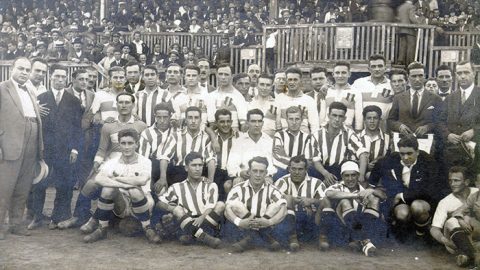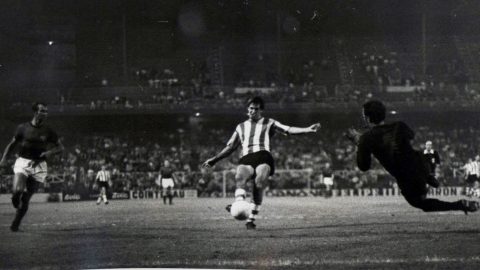Rivals to remember (III): From Eastern Europe
Rivals to remember (III): From Eastern Europe
Throughout its history, Athletic Club has faced teams with mysterious and interesting names that deserve to be known
The football teams that came from Eastern Europe were as attractive as enigmatic. Football coming from the USSR and countries like Hungary in the early years, and later, from Czechoslovakia, Yugoslavia or Poland, lived their golden decades during the Cold War and left us with very interesting names and stories of their matches against Athletic Club.
Gradanski Zagreb (San Mamés, 1923, March 19th and 22nd . Atotxa, September 1969)
When Gradanski Zagreb visited us in 1923 (3-0 in the first match and 1-2 in the second), their country was not yet officially called Yugoslavia. In fact, their name at that time was Kingdom of the Serbs, Croats and Slovenes. The life of this interesting club is attached to its status as a Croatian nation. Firstly, because it was founded in 1911 in response to the Magyar nationalist policies of the Austro-Hungarian Empire. And secondly, because in theory it disappeared when the new authority led by Marshal Tito punished it in 1945 for having taken part in the tournaments of the ephemeral and independent state of Croatia at that time. The coach, the technical staff, the supporters and, of course, most of the players, along with a few other players from the city’s teams, Hask and Concordia, joined a supposedly new club, almost identical to Gradanski, but which bore the nickname of so many other Soviet teams: Dinamo, in this case, from Zagreb.
PFC Beroe Stara Zagora (Beroe and San Mamés, 1973)
After taking the Moscow Torpedo out of the championship, another legendary Soviet team, in the sixteenth round of the Winners’ Cup, Athletic Club was left with the unknown Bulgarian team, Beroe. They, unexpectedly, sealed the tie in the first leg at Stara Zagora, beating the red-and-white 3-0. Nonetheless, the goal of Lasa in the return leg was not enough to get them back on track. That victory against the lions and a 1979 win over Juventus are its most remarkable international victories. As a matter of fact, they are one of the teams that have changed their name most times in their history: 16 times since it was founded in 1916.
Viktoria Zizkov (Saint Mamas, 1923, April 1st and 2nd )
This red-and-white team from the Prague suburb of Zizkov is one of the oldest within the Czech Republic. They visited us in the inter-war period (1-0 and 0-2), when Czechoslovakia’s football excelled to the point of ending up as runners-up in the 34th World Cup in Italy. Today, Viktoria Zizkov is playing in the country’s second division, behind the shadow of the capital’s top teams, Sparta and Slavia Prague. As a curiosity, this team is actually one of the oldest fiction films of the football genre, “Men Offside”, directed by Svatopluk Innemann in 1931, and based on the novel by the writer Karel Poláček, a great supporter of Viktoria.
Chinezul Timisoara (Banatul de Timisora, 1926)
Athletic’s first major European tour took place between August 28 and September 12, in 1926. In a fortnight, they played against SC Young Fellows and Swiss Grasshoppers in Zurich, Austria Wien in Vienna and MTK Budapest in the Hungarian capital, while their last match took them to Romania, where they lost 3-0 against Chinezul Timisoara. The team was founded in 1910, and after playing in the Hungarian league until the Great War, Chinezul dominated Romanian football in the 1920s, winning six consecutive championships. It disappeared in 1946, and the city of Timisoara was no longer attached to any particular football team, but to the birth of the actor who played Tarzan, Johnny Weissmüller.
 Athletic and Chinezul in Timisoara (AC Museoa).
Athletic and Chinezul in Timisoara (AC Museoa).
Vasas (San Mamés, 1971)
The history of Athletic Club will always be linked to Hungarian football through our rivalry with Ferencvarosi TC, the club we have faced more times in European competition. Or by MTK Budapest, who was the first team to lay flowers to Pichichi. Or also for having eliminated Czibor and Puskas’ Honved. Vasas got a draw (2-2) against us at Torneo Villa de Bilbao. Vasas is a faithful representative of the communist bloc in its golden age in the 1950s, 1960s and 1970s, founded in 1911 by the Hungarian Steelworkers’ Association, Vasas currently plays in the Hungarian second division, but still retains an honour that no one can take away from it: the club with the most Mitropa Cups titles, played between 1927 and 1992 against teams from Italy, Austria, Yugoslavia, Czechoslovakia and Hungary.
 Carlos, in the match against Vasas played in 1971 at San Mamés (AC Museoa).
Carlos, in the match against Vasas played in 1971 at San Mamés (AC Museoa).
